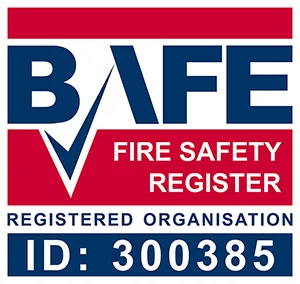The short answer is yes. In any UK commercial premises, fire safety is rightly seen as being a major priority, which is why it is mandatory to have a fire alarm system in place, in addition to fire extinguishers, for the protection of personnel as well as the building assets and infrastructure.
The installed system must meet the updated Regulatory Reform Order 2005 (RRO), which incorporates the Fire Safety Bill 2021.
Partly as a result of the Grenfell Fire, which has created greater awareness around fire and life safety regulations, the RRO and latest Fire Safety Bill have gone further than ever before in requiring organisations to pay closer attention to fire safety guidelines and compliance issues.
What is the RRO?
The RRO is the blueprint for minimum fire safety standards in non-domestic buildings and defines who is responsible for compliance.
A responsible person needs to take reasonable steps to reduce both the risk of fire in the building (or buildings) and to ensure that people can safely escape a building in the event of fire.
To comply with the legislation, specific fire safety duties should be undertaken, including conducting a fire risk assessment and acting on identified risks to minimise potential harm to the occupants of their building.
Failure to comply may result in penalties ranging from fines to a prison sentence.
The RRO falls under the remit of the local fire authority. A Fire Safety Officer would undertake inspections and recommend any action.
Who is responsible for fire safety in the workplace?
This covers a broad group of people and isn’t necessarily just down to one individual. In a business, or non-domestic premises, employers, owners and landlords, building managers, managing agents, as well as those occupying a building, all have a responsibility for fire safety.
Collectively, a decision would need to be made as to who would assume the overall day-to-day responsibility. Ideally, this wouldn’t be anyone at-distance. Instead, it would usually fall to the building occupiers, either a designated building manager or senior member of staff.
Depending on the number of people working in the building, especially if the premises are multi-tenanted, it might be necessary to appoint a small team of people who would work together to ensure fire safety regulations were followed. In that respect, there could be one or more “responsible persons”.
What happens with fire safety responsibility in a shared premises?
In shared premises, such as a multi-tenanted building, it would be usual for each individual business to designate their own person, who would have responsibility for fire safety for their own area of the building.
The common areas of the premises (e.g., stairways, reception areas, lifts, corridors) would come under the remit of the landlord, building manager or managing agent.
He or she would need to liaise with each individual fire safety member of staff, to ensure the overall safety of personnel and the premises.
What is the Responsible Person expected to do?
As the responsible person, your role is to:
- undertake a fire risk assessment of the premises which would be regularly reviewed
- inform staff or their representatives about the risks you’ve identified
- instigate and maintain appropriate fire safety measures
- emergency planning
- provide staff with information, as well as fire safety instruction and training
If more than five persons are employed, then the fire risk assessment must be a written document.
What types of buildings are affected by the RRO and Fire Safety Act 2021?
Basically, any non-domestic premises, which would be classified as:
- all workplaces and commercial premises
- all premises the public have access to
- the common areas of multi-occupied residential buildings
The Fire Safety Order also applies if you have paying guests, e.g., if you run a B&B, guesthouse or let out a self-catering facility.
What is the protocol for new buildings or during alterations and extensions?
Fire safety doesn’t just apply to completed and fully operational buildings. During the construction of new commercial premises or refurbishment of an existing property, it is important to comply with building regulations throughout. This would need to include designing fire safety into the proposed building or extension.
Are there penalties and enforcement if fire safety regulations are not followed?
Yes. If fire safety regulations are ignored or not correctly followed, in the most severe breaches, this could lead to a fine or even imprisonment. This could apply to the building owners and managers operating assets of over 15 metres in height, although any future guidance is likely to revise this height level downwards.
What happens if you previously held a fire certificate?
Since the new legislation came into force, fire certificates issued under the Fire Precautions Act 1971 have become outdated. It is now necessary to make any improvements under the remit of the new RRO. For reassurance, if your premises were built to recent building regulations, then it shouldn’t be necessary to make major changes to any existing fire safety systems.
What course of action is required to comply with the RRO and Fire Safety Act 2021?
In essence, the compliance process would need to incorporate and cover the following areas:
- fire assessment
- having a fire evacuation plan
- emergency lighting (with back-up batteries)
- appropriate signage
- fire doors
- 24/7 monitoring by an Alarm Receiving Centre (ARC)
How quickly do I need to act?
The legislation is now in place, so, in theory at least, businesses should have been prepared for this and be working on steps to demonstrate compliance. Over the next year or two, it will be necessary to show that your organisation has made progress towards full compliance, which would need to be reviewed annually.
How often is Servicing required?
It is a requirement to have a fire detection system regularly serviced. In the case of the fire alarm, this should be carried out at least every six months, preferably quarterly, and annually for the fire extinguishers.
Local fire and safety rescue authorities regularly inspect premises and can issue fire safety notices advising you about any changes that may be required.
Next Steps
Justice Fire & Security Managing Director Dave Sanders offers this advice: “Given the significance of the latest RRO and Fire Safety legislation, for many commercial operations, now is a prudent time to be making a comprehensive review of fire safety and compliance. This should mean putting a long-term fire safety strategy in place, in order to mitigate against both financial and reputational risk.”
He suggests that any planning should include provision for BS 8629 (Evacuation Alert System), Fire Emergency Evacuation Plan (FEEP) and Formal Evacuation Alert System (EACIE).
“Regarding compliance, there are a number of measures that building owners and managers can take to ensure they are fully fire safety compliant. As a starting point, make sure you discuss your building or commercial property portfolio with the Fire Service,” advises Dave, adding, “as a business, we also work closely with the region’s Fire Services and are well-placed to advise businesses of all size and across multiple sectors with the most appropriate, legally compliant fire safety equipment.”
Meanwhile, for further information about the Regulatory Reform (Fire Safety) Order 2005 click here
For further information about the Fire Safety Act 2021 click here
If you want help and advice about the effectiveness of your current fire safety equipment, Justice Fire & Security have more than 30 years of industry experience upon which you can draw.
We are based in Birmingham and offer a prompt service to domestic and business customers, most typically within a 50-mile radius of our West Midlands headquarters
The areas we cover include large parts of Staffordshire, Worcestershire, Leicestershire, Warwickshire, Northamptonshire, Derbyshire and Nottinghamshire including locations such as Wolverhampton, Coventry, West Bromwich, Solihull, Sutton Coldfield, Lichfield, Tamworth, Stafford and Stoke.
For all enquiries, simply call our main switchboard on 0845 257 0090.






